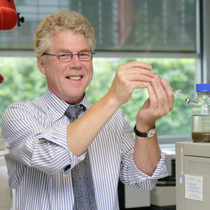Huub is Professor Environment and Water Technology and involved at AMS Institute since its inception. In the beginning as Principal Investigator, then supervising AMS Institute as a board member, now again as Principal Investigator. And as an examiner of the professional profile course for the MSc MADE program.
Huub’s research team develops circular approaches for water, waste and energy for urban and (agro)industrial systems. Circularity is the way to sustainability but offers a multitude of challenges: how to redesign urban and industrial systems and novel water, waste and energy infrastructure at a techno-economical, and societal feasible scale? How to design systems that protect human and environmental health, while considering effects of pharmaceuticals, antibiotics, pathogenic microorganisms, salt, corrosives and greenhouse gasses? These and other questions are addressed by Huub’s team in an integrative multidisciplinary way and solutions are designed in interaction with urban and industrial stakeholders. This is done in various Living labs; in Wageningen, Nieuwegein, Breda, Utrecht, Sneek, Delft, and internationally in Europe and China.
His team also develops cyclic industrial water provision for instance via the NWO programs Water Nexus and Entire - in Terneuzen, The Netherlands, Ho Chi Minh City Vietnam, and various locations in China. New circular resource projects are in preparation for Amsterdam.
Huub is director of the graduate school Wageningen Institute for Environmental and Climate research (WIMEK), chairman of the international conference AquaConSoil, partner professor in WETSUS, the European Institute for Sustainable Water Technology, senior advisor of Deltares, and member of the program council of the top sector (TKI) water technology. More information on WUR environmental technology can be found here.
The Environmental Technology Group has a Urban Systems Engineering group focusing on circular resource systems, especially water, nutrients, solid waste and energy. Amsterdam and AMS Institute are a perfect platform for research and teaching projects in this field.
“The innovative power of AMS Institute is a result of the merge of expertise from the natural systems of Wageningen the built environment department of Delft. By this, new and unique solutions can be created in circularity and livability with a global first in the region of Amsterdam.”
Huub Rijnaarts
Principal Investigator
